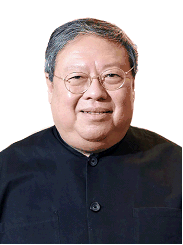
Dr. Patrick Ho
Deputy Chairman of China Energy Fund Committee; and former Secretary for Home Affairs of Hong Kong, China
HO Chi Ping Patrick, was born in Hong Kong, and educated in USA for 16 years. He possesses a Bachelor of Science Degree and a Doctor of Medicine Degree. Trained in eye surgery with special expertise in retinal surgery, he was a fellow at Harvard Medical School. He returned to Hong Kong in 1984 to teach eye surgery at the Hong Kong Chinese University as Professor of Ophthalmology.
Since 1993, he has been a member of the 8th, 9th, 10th, and 11th (National) Chinese People's Political Consultative Committee, and in 1995, he was appointed a member of the Preparatory Committee to plan for and organize the first Government of the Hong Kong Special Administrative Region (HKSAR) when Hong Kong sovereignty was being returned to China. He was the vice-chairman of the Hong Kong Policy Research Institute. In 1997, he became a member of the HKSAR Urban Council. In 2002, he joined the second term HKSAR Government as a Cabinet Member and the Secretary for Home Affairs with a policy portfolio ranging from district administration, community infrastructure development, human rights, arts and culture, sports and recreation, youth and religious matters, gaming and charities, to overall liaison with the civil society. He retired from his cabinet post on 1 July 2007.
Dr. Ho is at present, the deputy chairman, and secretary general of China Energy Fund Committee, a think-tank registered and anchored in Hong Kong, devoted to public diplomacy, with special emphasis on energy and culture. It is a not-for-profit, non-governmental think tank with special consultative status from the United Nations Social and Economic Council. Also, he is a Director of the National Association of Study on Hong Kong and Macau. In July 2014, he was invited by Ban Ki-moon, the eighth Secretary-General of the United Nations, to serve on his High-level Advisory Group on Sustainable Transport. In March 2016, he was appointed a Member of the Multi stakeholder Advisory Group of Internet Governance Forum, to advise the Secretary-General of the United Nations. Dr. Ho has made frequent interventions at meetings of the United Nations on sustainable development, energy, agriculture, culture and religion, poverty eradication, Ocean economy, internet governance, infrastructure development and partnership.
Since 1993, he has been a member of the 8th, 9th, 10th, and 11th (National) Chinese People's Political Consultative Committee, and in 1995, he was appointed a member of the Preparatory Committee to plan for and organize the first Government of the Hong Kong Special Administrative Region (HKSAR) when Hong Kong sovereignty was being returned to China. He was the vice-chairman of the Hong Kong Policy Research Institute. In 1997, he became a member of the HKSAR Urban Council. In 2002, he joined the second term HKSAR Government as a Cabinet Member and the Secretary for Home Affairs with a policy portfolio ranging from district administration, community infrastructure development, human rights, arts and culture, sports and recreation, youth and religious matters, gaming and charities, to overall liaison with the civil society. He retired from his cabinet post on 1 July 2007.
Dr. Ho is at present, the deputy chairman, and secretary general of China Energy Fund Committee, a think-tank registered and anchored in Hong Kong, devoted to public diplomacy, with special emphasis on energy and culture. It is a not-for-profit, non-governmental think tank with special consultative status from the United Nations Social and Economic Council. Also, he is a Director of the National Association of Study on Hong Kong and Macau. In July 2014, he was invited by Ban Ki-moon, the eighth Secretary-General of the United Nations, to serve on his High-level Advisory Group on Sustainable Transport. In March 2016, he was appointed a Member of the Multi stakeholder Advisory Group of Internet Governance Forum, to advise the Secretary-General of the United Nations. Dr. Ho has made frequent interventions at meetings of the United Nations on sustainable development, energy, agriculture, culture and religion, poverty eradication, Ocean economy, internet governance, infrastructure development and partnership.
